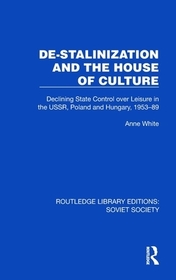
De-Stalinization and the House of Culture
Declining State Control over Leisure in the USSR, Poland and Hungary, 1953–1989
Series: Routledge Library Editions: Soviet Society;
- Publisher's listprice GBP 89.99
-
42 992 Ft (40 945 Ft + 5% VAT)
The price is estimated because at the time of ordering we do not know what conversion rates will apply to HUF / product currency when the book arrives. In case HUF is weaker, the price increases slightly, in case HUF is stronger, the price goes lower slightly.
- Discount 10% (cc. 4 299 Ft off)
- Discounted price 38 693 Ft (36 851 Ft + 5% VAT)
Subcribe now and take benefit of a favourable price.
Subscribe
42 992 Ft

Availability
Estimated delivery time: In stock at the publisher, but not at Prospero's office. Delivery time approx. 3-5 weeks.
Not in stock at Prospero.
Why don't you give exact delivery time?
Delivery time is estimated on our previous experiences. We give estimations only, because we order from outside Hungary, and the delivery time mainly depends on how quickly the publisher supplies the book. Faster or slower deliveries both happen, but we do our best to supply as quickly as possible.
Product details:
- Edition number 1
- Publisher Routledge
- Date of Publication 26 November 2024
- ISBN 9781032885384
- Binding Hardback
- No. of pages208 pages
- Size 234x156 mm
- Weight 540 g
- Language English 725
Categories
Short description:
De-Stalinization and the House of Culture (1990) looks at the houses of culture – arts centres which in the Stalinist period functioned as agencies of political socialisation – and the changes in their character and functions since Stalin’s death.
MoreLong description:
De-Stalinization and the House of Culture (1990) looks at the houses of culture – arts centres which in the Stalinist period functioned as agencies of political socialisation – and the changes in their character and functions since Stalin’s death. This book explores the diminishing control of the Communist Party over public leisure from 1953 to the present day, as one aspect of the de-Stalinization and the dismantling of the totalitarian system. It focuses on the changing nature and functions of the ‘cultural enlightenment’ conducted in houses of culture and similar institutions. Public rejection of the Stalinist attempt to saturate all leisure activities with propaganda and to liquidate many national cultural traditions have gradually forced the party to relinquish much of its leading role in this area. The book compares this process in three different Soviet-type systems, the USSR, Poland and Hungary. It discusses depoliticization of house of culture activities and, especially in the era of perestroika, their eventual repoliticization by unofficial associations concerned with a mix of political, cultural, social and environmental issues. Today the house of culture, a quintessentially Stalinist institution, paradoxically provides a home for an emergent civil society.
MoreTable of Contents:
1. De-Stalinization, Ideology and Leisure Policy 2. A Brief History of Cultural Enlightenment 3. Changing Content – Changing Goals? 4. Policy and Practice 1: Party and State 5. Policy and Practice 2: House of Culture Staff and the Public 6. The Effectiveness of Cultural Enlightenment 7. Conclusions: the Death of Communist Cultural Enlightenment?
More



